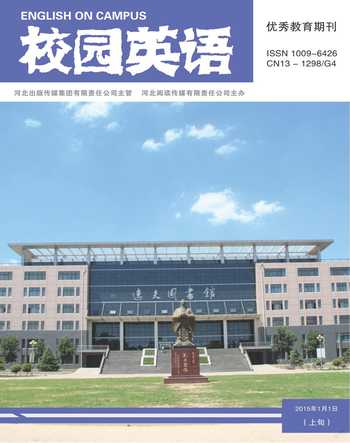Discussion on the Management of Collaborative Translation Project
陈意
【Abstract】With the rapidly increasing demands for translating, the number of translation projects is soaring and the scope of the project is expending to a large extent.Therefore, collaborative translation came into fashion breeding the needs for corresponding management which alters the traditional individual translation mode.The study of translation project management becomes necessary and is of great significance to MTI students.This paper makes a discussion on the management of collaborative translation projects standing in the position of a MTI student, composed of project analyzing and planning, translators organizing, translation quality optimizing and project schedule controlling.
【Key words】collaborative translation projects; management; project analyzing and planning; translators organizing; translation quality optimizing and project schedule controlling
To achieve the masters degree, a MTI student has to complete a certain number of translation.One MTI student in the College of Foreign Languages and Cultures of Chengdu University of Technology is obliged to translate at least 100,000 English words to Chinese before he can get his degree.A MTI student has to face a large number of complicated translation tasks which are referred to be translation projects.
Project means a piece of planned work or an activity which is finished over a period of time and intended to achieve a particular aim.Under the light of this statement, the accomplishment of a project needs all-round planning and certain periods of time.Translation project is translating work of appointed materials involving translators, project managers and the clients.Translators do translation collaboratively under the guidance of the project manager instructed by the client.The manager is obliged to make planning before initiating the project, organize translators and do the schedule controlling, exerting a direct influence on the translation quality.MTI student who is appointed as a manager has plenty of collaborative translating experience.
Project Analyzing and Planning
When receiving a translation project, the manager must make comprehensive analyses of it firstly, having an overall understanding and specifying the need of the project.Project need should be always in accord with the principle of SMART which is composed of the basic factors in the modern description of a project.S stands for “Specific”, M for “Measurable”, A for “Achievable”, R for “Realistic” and T for “Time-bound”.Firstly, the manager should ask the client for some details such as the target reader of the translation, the layout of the translated version and some specific requirements.Secondly, the manager should draw the main subject of the project doing an extensive research in the specific field.The collecting of specified terms and parallel texts are the major job during this period.For some areas, there are terminological dictionaries available, for example, the Illustrated English-Chinese Dictionary of Automotive Engineering, which can be used in the automotive field.But not all areas have corresponding dictionaries.In this case, the manager is forced to collect parallel texts of the project as many as possible and create terms reference list.Finally, the manager has to obtain the statistics of the words in the source language and estimate how many translators needed to accomplish the work within the time limit.Taking the above elements into consideration, the manager is ready to draw a specific plan for the project including the number of translators involved, the translation quality standard and the project schedule.
Translators Organizing
Two major factors affect the managers decision on translators selection.Translating experience is one of the major considerations of the manager for experienced translators have professional translating skills, collaborative abilities and translating efficiency.Translator who has relevant translating experience in the field of the project would be chosen in priority.Besides this, responsibility is another key factor.Selected translators must be willing to take the responsibility of submitting standard translation within the time schedule and be collaborative during the whole translating process, not only with the manager but also the other translators concerned.Considering these factors, the manager choose suitable translators informing them the subject, the task size, the specific requirements of the project, finally forming a translation group.
Translation Quality Optimizing and Project Schedule Controlling
Translation quality controlling breaks into three stages--the preparing, the translating and the proof reading, each of which is of same significance.In the preparation stage, works out standard translation samples with the members and the client.The samples are linguistically standard and gain high satisfaction from the client.British History professor A.F.Tytler proposed that the translation should be in complete accordance with the idea, the style and the manner of original work.Under the guidance of these professional theories, the translation samples are faithful to the original text.
Translators start their work after a thorough understanding of the sample.During translating process, the manager collects translation and do sampling inspection and propose suggestions in certain periods.In this stage, time controlling is crucial to the manager because it is directly influence the translation quality.Meanwhile, the manager contacts the client regularly for some specific knowledge on the certain field.
Once the first translation version of the whole task is done, the manager makes up a proof reading plan to polish up the translation and unify the translation style.Stylistic problems are unavoidably in collaborative projects, which has to be solved in the proof reading period.Firstly, translators reread the work of each other and do proper adjustment.Secondly, the manager read the whole translation to finalize it.The final translation version will be sent to the client one or two weeks before the appointed deadline, for this leaves the client time to respond to the work as well as to give translators time to do further adjustment if it is necessary.
Conclusion
With the collaborative work of the manager, translators and client, the translation is highly qualified.Laborers in the project is obviously significant, but the management in every translating period is also indispensable.
Reference:
[1]Cambridge Dictionaries Online.
[2]北京大学外国语学院,MTI教育中心.
[3]A.F.Ttyler: Essay on the Principles of Translation,1791.
[4]Pérez, C.R..Translation and project management[J].Translation Journal,2002.

